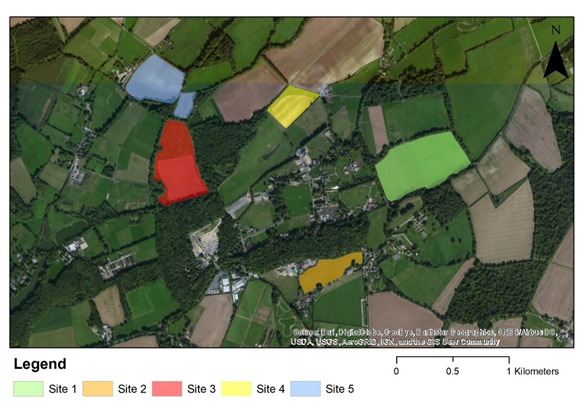As a lover of field work, my UK-based eight-month research project for my Masters was something I had been anticipating most about the MRes, and I was not disappointed. My project focused on how certain land management (e.g. agricultural land vs conservation land) affects reptile species assemblages in Southern England. There are few published studies which focus on reptile species assemblages in the UK, with most studies choosing to focus on the behaviours or distributions of a single reptile species. Reptiles are a good bioindicator of healthy habitat and reptile assessments provide some insight into the status of a habitat. For this reason as well as recent declines, most notably in Southern England, it is important to include reptiles in management practices, so I sought to find out more about the reptile distribution around Marwell Zoo.
My field work took place in the land surrounding Marwell Zoo, which would become my “office” for three months whilst I collected data. It was a pleasure to spend time in the beautiful fields, woodland and farmland around Marwell, an experience that I was still appreciating even by the final week of field work! Over the three months, I carried out reptile surveys across five sites around Marwell Zoo, during which I found grass snakes and slow worms. As well as doing reptile surveys I also did habitat assessments to supplement the reptile surveys and better understand the specific microhabitats being utilised by the reptiles. During some days of field work I was walking up to 20km a day, tiring but very rewarding! From spending so much time outside and walking between sites I saw lots of British wildlife including foxes (Vulpes vulpes), hare (Lepus europaeus), pheasants (Phasianus colchicus), partridges (Perdix perdix/Alectoris rufa), frogs (Rana temporaria), toads (Bufo bufo), multiple deer species (Dama dama/Muntiacus/Cervus elaphus/Capreolus capreolus), mice (Apodemus sylvaticus), shrew (Sorex araneus), voles (Microtus agrestis), buzzards (Buteo buteo), kestrels (Falco tinnunculus) and more.

Left: adult grass snake (Natrix natrix), centre: juvenile grass snake, right: adult slow-worm (Anguis fragilis)
Carrying out the project was no easy feat, but two pairs of wellies and miles of walking later, I had collected all my data. Surprisingly, the hardest part of this project was not the demanding field work and 20km hikes. Data analysis proved to be a major challenge of the project: those who have used R statistical software will know exactly what I mean! Many plots, calculations, maps and statistical tests later, I had my results, and eventually my completed Masters thesis. My research will help Marwell take resident reptile populations into account in their UK-based conservation management, meaning it was worth the work. And yes, I still love field work.
— Victoria
Posted By : Aggie Thompson